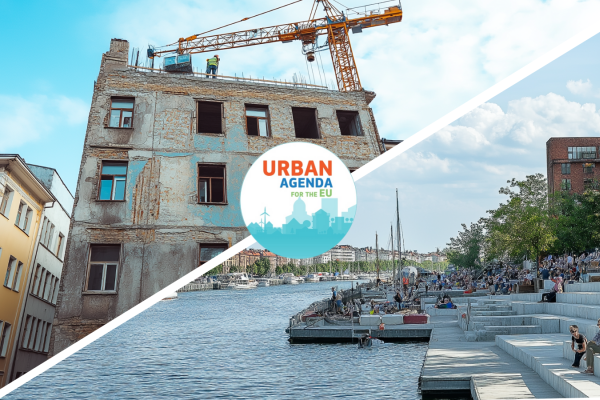
Call for Urban Agenda's Thematic Partnerships is open!
About the Urban Agenda for the EU
The Urban Agenda for the EU (UAEU) is a multilevel and multistakeholder working method and institutional innovation to address the urban dimension of EU policies. It promotes cooperation between Member States, cities, the European Commission, and other stakeholders, by forming Thematic Partnerships on critical urban challenges. The overall objective is to integrate urban considerations into EU policies, ensuring better regulation, funding, and knowledge for cities across Europe.
Find out more about the Urban Agenda for the EU on their website!
Call for Partners
The Call for Partners will be open from 28 August to 2 October, leaving interested partners enough time to apply after the summer period.
An online applicant seminar will take place on 5 September where interested stakeholders will get more information about the application process as well as what to expect from a Thematic Partnership within the Urban Agenda for the EU. You can register here.
Once the call is closed, the applications are carefully assessed by the EAA expert taking into consideration the diversity of stakeholders, the geographical location in Europe and the variety of size of urban authorities. Once approved by the DGUM in the November 2024, the Thematic Partnership on Water Sensitive City will be launched and ready to kick-off in early 2025.
About the Thematic Areas
Water Sensitive City
Rapid urban growth in European cities has led to significant artificial land cover, which in some cities has greatly increased the effects of rainwater runoff. This phenomenon, combined with the effects of climate change, including increased precipitation alternating with droughts, can lead to significant flood risks. In the EU context, several ongoing developments within cities contribute to the pressing issues of water scarcity and floods, which pose challenges to sustainable urban development (Climate Change, Ageing infrastructure, Land-use changes, inefficient water management practices, lack of integrated approaches).
To address these challenges, a multi-level governance approach could help improve and create tools, measures and governance mechanisms to help implementing sustainable urban drainage systems, reusing water, set up storage systems promoting water conservation measures, to build models of water sensitive urban management and promote integrated approaches.
You can read more and find all the related documents about the Call for the Thematic Partnership on Water Sensitive City here
Apply to the Call for Thematic Partnership on Water Sensitive City.
Building Decarbonisation
The European Union has set very ambitious energy and climate goals, including the decarbonization of the building stock by 2050. For achieving these goals Member States are obliged to develop and submit National Energy and Climate Integrated Plans (NECPS) and Long-Term Renovation Strategies for improving the energy efficiency and retrofitting of the building stock. The recently adopted Energy Efficiency Directive (EED) also foresees for cities of minimum 45,000 inhabitants to develop local cooling and heating plans. Adding to this, the Renewable Energy Directive (RED) also include a mandatory percentage of renewable energy in these local heating and cooling plans.
This partnership proposes to address decarbonisation of building through a strategic integrated approach, going beyond individual buildings and encouraging the district/neighbourhood approach and make full use of the provisions in the revised directives. Local heating and cooling plans are among the important steps towards decarbonisation of buildings. This approach could be linked with development of district heating, the development of energy communities and energy sharing and explore the possibilities of the Electricity Market Design reform. To put these objectives in practice, it is important to develop strategies and plans at the local level.
You can read more and find all the related documents about the Call for the Thematic Partnership on Building Decarbonisation here.
Apply to the Call for Thematic Partnership on Building Decarbonisation.